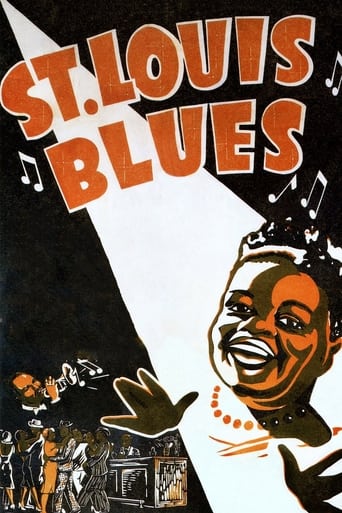bessiesmith-1
Not a great film in the artistic sense, but it is all we will ever see of Bessie Smith in action, and the music is wonderful. All the more reason to criticize the NAACP's attempt to have all copes destroyed. The found the crapshoot scene demeaning. Fortunately, this attempt at censorship failed.Years ago, Isabel Washington, who was the first Mrs. Adam Clayton Powell, told me how she came to play opposite Bessie in this 1929 two-reeler. "They wanted my sister, Fredi, who was already in pictures, but she had the flu and recommended me. When I auditioned, they said I was too light, so I told them that I could be dipped. They agreed and I got the part."Fredi Washington is perhaps best known for her role in the 1934 Universal Pictures film, "Imitation of Life." Having served well to get Adam Clayton Powell elected, Isabel was divorced from him, and he married pianist Hazel Scott.
MartinHafer
Bessie Smith is a legendary Black entertainer from the Harlem Renaissance. However, sadly, this is the ONLY known film in which she appeared. So, for historical reasons, this short if like gold. Now I am sure some might not agree--as the film shows Black people gambling and carousing and doing a lot of stereotypical behaviors. However, this was THE predominate view given in both Black and White-produced films of the time and you can't expect a lot of enlightenment back in 1929. It is a portrait of who we were as a nation at the time and who we wanted us to be--and I say just accept it as a little window into the times and way people thought. Plus, remember, this is still the only way to watch Smith perform...so deal with it! "St. Louis Blues" gets its name from the famous W.C. Handy song of the same title. It consists of Smith arguing with her gambling and carousing boyfriend as well as Smith smacking the crap out of one of Jimmy's floozies! He slaps her around and mistreats her...yet she begs him not to leave. I KNOW this is very negative--a terrible message for women then and now. BUT, as I said, it is what it is. What follows is Smith singing her very famous tune "My Man"--and she sings it with a lot of soul and style. It also is an interesting short because it plays much less like a typical music video of the age but like a mini-movie. Smith was some talent and it's a great window into the times--warts and all.
tavm
In continuing to review the film accomplishments of African-Americans on film in chronological order for Black History Month, we're now at the start of the talkies. St. Louis Blues is the only film appearance of the legendary singer Bessie Smith. As an excuse to warble the classic W. C. Handy-composed song that's the title of this short, Ms. Smith gets two-timed and then rejected by Jimmy Mordecai. The other woman is the light-skinned Isabel Washington, sister of Fredi Washington who's in the next short I'm reviewing, Black and Tan. Anyway, when she sings, Bessie is in a class by herself though I wish the recording on the soundtrack (which was presumably live) had sounded sharper. Mordecai later returns for some tap-dancing before coming back to Ms. Smith only to reject her again when he gets her money from her leg garter. Then she reprises before "The End" flashes on the screen. This interesting curio also had the Hall Johnson Choir doing the chorus with James P. Johnson playing the piano. One more interesting fact: The distributor was Sack Amusement Enterprises which later handled later race movies like Spencer Williams' The Blood of Jesus and Go Down Death.
Jay Phelps
If you've ever wanted to see the great Bessie Smith perform, this is your one chance--her only film appearance is in this short.For an early talkie, a lot of things were done right. The wrap-around plot involving the 'no-good boyfriend who done her wrong' is really quite effective, and unnerving, in it's violence. The camerawork in the big bar scene is generally well done, with people passing in front of the camera going about their business. It's obviously a one-take deal, with several cameras recording the action at the same time as three-camera sitcoms do.But you're left wondering about the stupidity of the director who obviously hid Bessie's mic on the bar, but failed to set up a camera behind the bar! Yes she sings, but we're treated to her backside mostly, with only an occasional glimpse of her profile. You can't really blame that poor thinking on early sound technology.


 AD
AD

